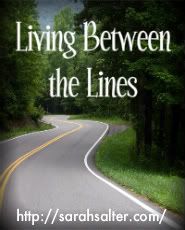|
 I had seen the movie Hidden
Places advertised on TV several times. I think that at one
time I actually saw a few minutes of it. But in my busy household,
where television is often relegated to background noise while I’m
cleaning, eating dinner, or writing, I never sat down and watched the
movie, even though Hidden Places was on my
going-to-read and going-to-watch list—which incidentally gets longer
and longer every day—I had just never gotten around to actually reading
or watching it. I had seen the movie Hidden
Places advertised on TV several times. I think that at one
time I actually saw a few minutes of it. But in my busy household,
where television is often relegated to background noise while I’m
cleaning, eating dinner, or writing, I never sat down and watched the
movie, even though Hidden Places was on my
going-to-read and going-to-watch list—which incidentally gets longer
and longer every day—I had just never gotten around to actually reading
or watching it.
Around Christmastime, I finally
decided that it was time to tackle them. I bought a used copy of the
book online, but when I pulled up the TV schedule, expecting to find
this movie, it wasn’t listed. Going to Plan B, I sent my dad to his
local Christian store to look for a copy, but they didn’t carry it!
Finally, I found it in the sale bin at a usually overpriced store.
It was worth the trouble.
After the death of her husband
and then her father-in-law, Eliza Wyatt was alone with three children
to feed and an orchard to run during the height of the Great
Depression. Her husband’s crazy old Aunt Betty (whom everybody called
Batty because, well, she was batty) prayed for God to send Eliza an
angel to help her, but when a dirty, starved, deathly sick, homeless
man shows up on her back porch, Eliza is pretty sure that it isn’t an
answer to prayer. But what if she’s wrong?
As Gabe lies delirious and
fevered in the guest room, things go from bad to worse. The bank is
closing and they call the loan on the house and orchard. To search for
the answer to her problems, Eliza is going to have to face her own
carefully buried past, as well as Aunt Batty’s, and the stranger’s. But
is even that going to be enough to save her family?
Lynn Austin’s Christy
Award–winning book was a treat to read. I typically favor suspenseful,
edgy plots. And although this book is historical fiction, the story was
so skillfully crafted and intricately layered that there was a perfect
balance of drama and tension. It not only kept my attention, but it was
all I could do not to read ahead to find out how everything worked out.
Even better, Austin surprised me by resolving each conflict and each
character in a completely unpredictable way.
As the title intimates, the book
is about the hidden places in the lives, histories, and hearts of the
characters. As the story unfolds, Austin opens up the characters at
their seams—one stitch at a time—much the way God opens His children
when it is time to make changes in our lives. One of my favorite parts
was how as each character’s flaws and sins were brought to light, the
character was pointed to God to fix and heal them. It made the story
seem like a parable about the possibility of redemption.
The
movie version of Hidden Places was enjoyable as
well. Directed by Yelena Lanskaya, the cast boasted veteran actors
|
Jason Gedrick as the male lead, Gabe Harper; Shirley Jones as
supporting actress, Aunt Batty; Barry Corbin as the sheriff; and Tom
Bosley as the cranky banker, Mr. Wakefield. Long-time soap opera
actress, Sydney Penny, had the lead role of Eliza Wyatt.
This movie adaptation was like
many other adaptations I’ve written about in this column, in that it
was a valiant attempt to squeeze a four hundred twenty-nine page book
into an eighty-six minute movie. There is just no way to encapsulate
that much content and context into so small a format. So, as a reader
and watcher, I ask myself questions that help me to decide the success
of the movie.
First, does the movie’s theme
match the original theme found in the novel? Sadly, while this is a
good movie, I have to say that no, the theme of the movie is different
from the novel’s. While the novel’s theme focuses on excavating the
secret and hidden sins, hurts, and lessons of the past, the movie’s
theme is centered around the plot of saving the orchard. While saving
the orchard is important to the book, the deeper context is about the
state of the hearts of the characters. The movie addresses that only
tangentially.
This leads to my second
question: Because the novel and movie carry the label of “Christian,”
does their story convey a message that exemplifies Christ? I am
ambivalent about this. While the movie does not come across as
unchristian in any way, the Christian message is understated. Outside
of saying grace at meals and a few timely statements by Aunt Batty,
there is no overt link between this movie and Christ. Out of all of the
differences between the novel and the movie, I found myself least able
to overlook one of the main points of the book, which was for the
characters to learn to trust God rather than man. But in the movie,
Gabe, the sheriff, and other men are looked to as savior figures. As a
Christian watching a Christian movie, that’s a bitter pill to swallow.
This month, I am choosing the
bookstore over the box office. While the movie was a nice, sweet,
feel-good film that I would easily recommend for family movie night, I
feel that the book has too much precious truth to miss. Hidden
Places is a well-written, entertaining, and inspirational
read.


|